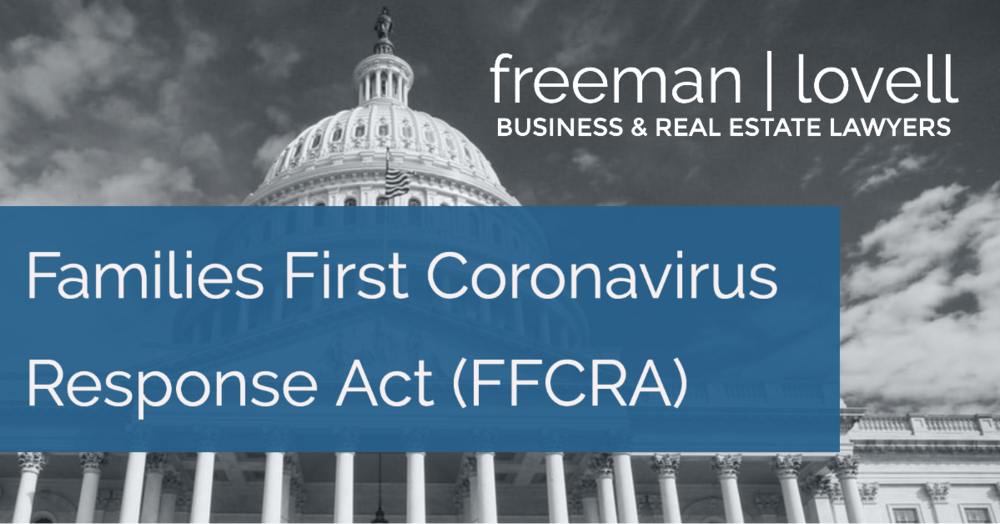Prepared by Michael Thomas

We have had a number of clients and other members of the community who are employers reach out to us about their obligations to employees during this time when business is halting or stagnating due to concerns over the spread of COVID-19. In an effort to keep people employed and paid while handling treatment and safety precautions, Congress has enacted the Families First Coronavirus Response Act (the “FFCRA”).
The highlights of the FFCRA are as follows:
- The provisions go into effect on April 1, 2020 . It is scheduled to last until December 31, 2020.
- Employers will receive tax credits to offset the cost of providing the paid leave required under the FFCRA.
- Every employer with fewer than 500 employees is required to comply with these emergency leave requirements.
- There is an exception available for employers of healthcare providers or emergency responders to exempt such employees from leave at their election.
- Also, the Secretary of Labor can exempt small businesses with fewer than 50 employees if compliance with the requirements would jeopardize the viability of the business as a going concern.
- Employers must notify employees of their rights under the FFCRA. The Department of Labor has prepared a standard form notice . Each covered employer must post a notice in a conspicuous place on its premises. An employer may satisfy this requirement by emailing or direct mailing this notice to employees, or posting this notice on an employee information internal or external website.
SICK & QUARANTINED EMPLOYEES
Employers must provide Emergency Paid Sick Leave to an employee who is unable to work or telework because the employee is:
- subject to quarantine or isolation order;
- has been advised by a health care provider to self-quarantine due to coronavirus concerns; or
- is experiencing symptoms of coronavirus.
Employers must provide pay for up to 80 hours of paid sick leave for these people. Wages are limited to $511 per day up to $5,110 total per employee for their own use.
Employees who work a part-time or irregular schedule are entitled to be paid based on the average number of hours the employee worked for the six months prior to taking paid sick leave.
Employees who have worked for less than six months prior to leave are entitled to the average number of hours the employee would normally be scheduled to work over a two-week period.
Sick leave benefits are also available to employees who are:
- caring for an individual subject to a federal, state or local quarantine or isolation order or advised by a health care provider to self-quarantine due to COVID-19 concerns;
- caring for the employee’s child if the child’s school or place of care is closed or the child’s care provider is unavailable due to public health emergency; or
- experiencing any other substantially similar condition specified by the Secretary of Health and Human Services in consultation with the Secretary of the Treasury and the Secretary of Labor.
For these situations, the payment requirement is less: two-thirds the employee’s regular rate with a cap of $200 per day, up to $2,000 total per employee.
PARENT EMPLOYEES
- An employee must be offered leave if he or she is unable to work due to a need to care for their child because the school or daycare has been closed or the child care provider is unavailable due to a public health emergency.
- ·An employer must pay at least two-thirds of the employee’s regular pay, up to $200/day and $10,000 over the benefit period.
- The first 10 days taken may be unpaid, but the employee may use other paid leave during that period, if available.
- Employees are covered if they have worked for an employer for at least 30 days.
- If employers have 25 or more employees, they must return an employee who takes emergency FMLA leave to the same or equivalent position when the employee returns. If the company has fewer than 25 employees, and the position is eliminated during the leave, that requirement does not apply.
LAYOFFS
Unfortunately, some employers are being forced to consider furloughs (mandatory, temporary unpaid leave) and layoffs.
- The express language of the FFCRA is unclear on whether employees are still eligible for benefits if they are furloughed or laid off before April 1, 2020.
- At minimum, employers should take care not to base lay off or furlough decisions on which employees are likely to need leave—or risk claims for retaliation/interference.
- The WARN Act may apply, requiring advance notice of a mass layoff.
- This memo covers the most commonly asked questions about the FFCRA. If you have questions about a specific situation and would like legal advice, please reach out to Michael Thomas at Michael.Thomas@freemanlovell.com to schedule a time for further discussion.
This memo is provided for your reference and information and does not constitute legal advice. Giving legal advice requires us to establish an attorney-client relationship, including a review for conflicts of interest. This summary is current as of the date above.




